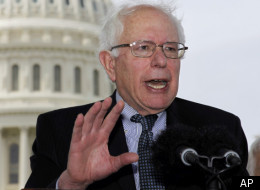Posted: 04/18/2012 5:01 pm Updated: 04/18/2012 5:48 pm

Sen. Bernie Sanders spoke at an April 18 event highlighting
efforts by grassroots organizers to push for an anti-Citizens United
amendment.
While the stage was set with speeches from congressional sponsors of a constitutional amendment to overturn the 2010 Supreme Court decision -- including remarks from Sens. Bernie Sanders (I-Vt.), Tom Udall (D-N.M.) and Chuck Schumer (D-N.Y.) -- the event focused on people across the country mobilizing in support of an amendment.
"We have developing here a grassroots movement," Udall said.
So far, 20 resolutions calling to overturn Citizens United, which freed corporations and unions to spend unlimited amounts of money in elections, have been introduced in state legislatures, with measures passing in New Mexico and Hawaii. A number of cities and towns have passed similar resolutions.
Representing those grassroots efforts, four individuals pushing for support of a constitutional amendment in their own communities spoke at Wednesday's event.
David Marshall of Portland, Maine, noted that he had come to this issue thanks to his constituents. "It was the enthusiasm of my constituents that inspired me as a city councilor to sponsor a resolution urging the Congress to amend the Constitution to end corporate personhood and to overturn Citizens United," Marshall said. On Jan. 18, 2012, Portland passed just such a resolution.
State Rep. Mimi Stewart described how the New Mexico legislature went from voting down an anti-Citizens United resolution in 2011 to voting for a similar resolution in 2012. "What is different?" she asked rhetorically. "The public is starting to get it. The public is behind it." She said people were "calling into legislators who would otherwise not vote for this to get them to understand that their constituents really wanted this."
Activist Georgina Forbes explained how citizens worked to get 66 Vermont towns to adopt resolutions in favor of a constitutional amendment. "In my town of Norwich and in 65 other towns, hundreds of people like me stood at the dump, outside of the post office, in front of the general store and spoke with our neighbors and gathered names on petitions to get this article on the ballot," she said.
State Sen. Jamie Raskin, who is pushing for a resolution in the Maryland legislature, paraphrased the late Justice Byron White's dissent in a 1978 Supreme Court case that granted corporations the right to certain political speech. "The state need not permit its own creation to consume and devour it," Raskin said. "And yet that's precisely what the Supreme Court did in the Citizens United decision."
In addition to the three senators, at least 11 members of Congress were at the event: Democratic Reps. John Conyers (Mich.), Donna Edwards (Md.), Keith Ellison (Minn.), Rush Holt (N.J.), John Sarbanes (Md.), Betty Sutton (Ohio), Sheila Jackson Lee (Texas), Ted Deutch (Fla.), Hank Johnson (Ga.), Peter Welch (Vt.), and David Cicilline (R.I.). The lawmakers used their time at the microphone to highlight their support for the people's efforts to overturn Citizens United.
Schumer decried Citizens United, calling it "the worst decision since Plessy v. Ferguson," the infamous 1896 ruling that supported racial segregation with the doctrine of "separate but equal."
"At the very deepest sense, we are fighting to make sure that America does not become an oligarchy where people with unlimited sums of money control the political process and the economic process," Sanders said.
Udall put opposition to Citizens United and corporate personhood at the center of reform efforts. "All of the issues that you all love, that you care about -- whether it's tax fairness or whether it's making sure that the middle class grows -- all of those issues function around this issue. This is the core issue," he said.
And Edwards argued, "The question is not whether we should amend the Constitution. The question is whether we are going to have the leadership in the House of Representatives and the United States Senate to reflect the will of the American people and return elections back to the people."
Wednesday's event was also organized by a number of groups opposed to the Supreme Court ruling, including Public Citizen, Common Cause, People for the American Way, Move to Amend and Communications Workers of America.
Since the Citizens United decision, there's been an explosion in political spending by independent groups, which are now allowed to accept unlimited contributions from corporations, unions and individuals. Independent group spending set a record in the midterm election year of 2010 -- midterm election years usually see lower spending than presidential election years -- and is on pace to shatter that record in the 2012 election cycle.